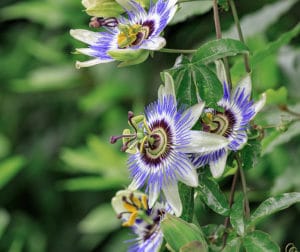Table of Contents
Passionflower (Passiflora incarnata, Passiflora caerulea, Passiflora edulis, Passiflora foetida) is a perennial vining plant native to North and South America.
Passionflower has been used for centuries to treat anxiety and sleep disorders. And more recent research shows its potential role in reducing symptoms of Parkinson’s disease.
Passionflower has sedative properties that help calm you.[i] It has been shown to reduce anxiety. Including before surgery.
Passionflower promotes restful sleep and has been used to treat insomnia for millennia. Providing deep, restful sleep and leaving you feeling refreshed and well-rested in the next day.
Passionflower modulates GABA in your brain. GABA is your primary inhibitory neurotransmitter.
Passionflower shows potent antioxidant activity, likely due to its flavonoid and alkaloid content. And several studies show flavonoids are neuroprotective.[ii]
Antioxidants seek out and scavenge free radicals. A balance between free radicals and antioxidants to counteract them is necessary for healthy cellular function. And to reduce oxidative stress.
As a nootropic, Passionflower is used primarily to lower stress and promote a good night’s sleep.
Passionflower helps:
- Anxiety: Passionflower supports healthy GABA levels in your brain.[iii] As a nootropic it provides an anxiolytic effect without the unwanted side effects of anti-anxiety meds.[iv]
- Sleep: Passionflower supports healthy sleep.[v] It has been shown to improve sleep quality and feeling refreshed the next morning.[vi]
- Neuromodulator: Passionflower modulates the levels of GABA in your brain. Passionflower inhibits GABA uptake in synapses without affecting GABA release or GABA transaminase activity.[vii]
Overview
Passionflower (Passiflora incarnata, Passiflora caerulea, Passiflora edulis, Passiflora foetida) is a perennial vining plant native to Central and South America. It produces white with lavender-fringed flowers having 10 white petals, and a central crown of pinkish-purple filaments.
 There are over 520 different species belonging to the Passifloraceae family. In the southeastern United States, it is often called Maypop, named after the edible fruit, it produces a “pop” when crushed.
There are over 520 different species belonging to the Passifloraceae family. In the southeastern United States, it is often called Maypop, named after the edible fruit, it produces a “pop” when crushed.
Passionflower was known to Native Americans as an herbal remedy long before the Spanish conquistadors arrived. The name Passionflower came from Roman Catholic priests in the 1500’s. They reported seeing symbols of the Passion of Jesus Christ in the parts of the plant.
Used for centuries by Native Americans, Passionflower is known for its ability to reduce anxiety and insomnia. Recent clinical studies confirm the neuroscience showing Passionflower as being effective for these traditional uses.
The flavonoids found in Passionflower are partial agonists of GABAA receptors and inhibit the uptake of GABA into synapses.[viii]
The flavonoids in Passionflower include apigenin, luteolin, quercetin, and kaempferol.[ix]
Passionflower is used for anxiety, Generalized Anxiety Disorder (GAD), symptoms of opiate withdrawal, insomnia, nerve pain, convulsions, bronchial spasms, ADHD, palpitations, cardiac rhythm abnormalities, hypertension, sexual dysfunction, and menopause.[x]
New studies are emerging that look at the science behind these uses and other possible benefits of Passionflower. Including helping with panic attacks, seizures, headaches, menstrual pain, and Parkinson’s disease.
 How does Passionflower work in the brain?
How does Passionflower work in the brain?
Passionflower boosts brain health and function in several ways. But two in particular stand out.
- Passionflower is anti-anxiety. The symptoms of anxiety and depression are often due to an imbalance of excitatory and inhibitory neurotransmitters in the brain.
One mechanism involves the GABA system and a GABAA (benzodiazepine) receptor which is the binding site of benzodiazepines, and which regulate chloride flow through ion channels.[xi]
Studies show the anxiolytic activity of Passionflower is due to Passiflora apigenin and chrysin which are partial agonists of the same GABAA receptors.[xii]
One randomized, double-blind clinical trial was conducted with 40 volunteers who were about to undergo an anxiety-inducing tooth extraction. The volunteers were given 260 mg of Passionflower or 15 mg of midazolam 30 minutes before surgery.
The researchers concluded that Passionflower showed anxiolytic effects similar to midazolam. And was a safe and effective sedation alternative for adult patients undergoing a tooth extraction.[xiii]
- Passionflower for sleep. Passionflower is a traditional herbal sedative, anxiolytic, and popular sleep aid used for the treatment of insomnia.
And several clinical studies have demonstrated its efficacy as a sleep aid in lab animals. But clinical trials in humans were lacking
So, researchers at Monash University in Australia decided to investigate Passionflower herbal tea on human sleep. 41 volunteers aged 18 – 35 were selected to participate in the experiment.
Each study participant consumed a cup of Passionflower tea and filled out a sleep diary daily for 7 days. Of the 6 sleep-diary measures analyzed, sleep quality showed a significantly better rating for Passionflower compared to the placebo.
The researchers concluded that the consumption of low-dose Passionflower tea resulted in sleep benefits for healthy adults with mild fluctuations in sleep quality.[xiv]
 How things go bad
How things go bad
Passionflower modulates how GABA works in your brain. It works as a GABAa receptor antagonist.[xv]
Dysfunction of the GABA system is implicated in several neuropsychiatric conditions. Which can result in:
↑ Increased anxiety
↑ Increased symptoms of depression
↑ Poor sleep quality including insomnia[xvi]
↓ Memory, cognition, and decision-making ability suffers
↓ Declines in quality of life
Supplementing with Passionflower may help relieve anxiety and depression, improve your quality of sleep, and your overall sense of well-being.
Passionflower benefits
Hundreds of peer-reviewed clinical studies have been published on the benefits of Passionflower. Passionflower has been well-established as an anxiolytic and sedative.[xvii]
 Passionflower has also been shown to:
Passionflower has also been shown to:
- Reduce general anxiety[xviii] [xix]
- Reduce anxiety before surgery[xx][xxi]
- Treat insomnia[xxii]
- Improve sleep quality[xxiii][xxiv]
- Modulate GABA levels in your brain[xxv][xxvi]
- Work as an anti-inflammatory and antioxidant[xxvii]
- Have potential for Parkinson’s disease[xxviii]
- Help in the treatment of opiate withdrawal[xxix]
- Reduce hot flashes and night sweats associated with menopause[xxx]
How does Passionflower feel?
Neurohackers report improved sleep quality with Passionflower. They say it helps them fall asleep and sleep more deeply.
 Some report Passionflower helped them taper off opiates with fewer withdrawal symptoms including better sleep and less anxiety.
Some report Passionflower helped them taper off opiates with fewer withdrawal symptoms including better sleep and less anxiety.
One person who calls herself a “Type A” personality said it “helps shut my brain off and drift into sleep peacefully.”
Unlike using sleep meds, neurohackers say when using Passionflower for sleep they don’t feel as “zonked out” as they do when using sleep meds. Sleep is better and it’s easier to get going the next morning.
Many Passionflower users say it provides relief from anxiety. It “takes the edge” off and helps them work past their anxiety instead of becoming paralyzed by it.
Passionflower helps calm you but without the side effects associated with anti-anxiety meds. And you cannot become physically dependent on it like you can with anti-anxiety drugs.
 Passionflower Clinical Research
Passionflower Clinical Research
Passionflower has been used for millennia to reduce anxiety and for restful sleep. It’s also used for panic attacks, seizures, hypertension, headaches, and menstrual pain.[xxxi]
Passionflower is often combined with other nootropic herbs such as Valerian or Lemon Balm for insomnia. And with St. John’s wort for depression.
Here are 3 more human clinical studies for Passionflower used for anxiety and sleep.
Passionflower compared to an anti-anxiety med
A randomized, double-blind, controlled study published in the Journal of Clinical Pharmacy and Therapeutics examined the effect of Passionflower on Generalized Anxiety Disorder (GAD). It compared the efficacy of Passionflower to oxazepam, a pharmaceutical sedative.
36 Patients diagnosed with GAD were randomly assigned to receive either 45 drops/day of Passionflower extract, or 30 mg/day oxazepam for 4 weeks.
The study found that Passionflower extract was equally effective as oxazepam for treating GAD.
The researchers concluded, “The results suggest that Passiflora extract is an effective drug for the management of generalized anxiety disorder, and the low incidence of impairment of job performance with Passiflora extract compared to oxazepam is an advantage.”[xxxii]
Passionflower for anxiety before surgery
Patients who undergo anesthesia before surgery typically experience anxiety.
A research team at Ankara Training and Research Hospital in Turkey conducted a study using Passionflower with 60 patients aged 25-55 years about to get spinal anesthesia.
Their intention was to investigate the efficacy of Passionflower on anxiety, psychomotor function, sedation, and blood pressure when taken as a supplement prior to anesthesia.
The patients received Passionflower syrup (700 mg/5 mL aqueous extract) or a placebo 30 minutes before spinal anesthesia.
After the surgery was complete the researchers concluded “oral administration of Passionflower suppressed anxiety before spinal anesthesia without changing psychomotor performance or blood pressure and produced no side effects”.[xxxiii]
Passionflower for sleep
A double-blind randomized placebo-controlled clinical study published in 2020 examined the effect of Passionflower on insomnia.
A research team at the Soonchunhyang University College of Medicine in Korea used polysomnographic technology to investigate the effects of Passionflower in subjects suffering from insomnia.
Polysomnography, also called a sleep study, is a comprehensive test used to diagnose sleep disorders. Polysomnography records your brain waves, the oxygen level in your blood, heart rate and breathing, as well as eye and leg movements during a study.
110 adult participants with an average age of 40 years old and who were diagnosed with insomnia disorder were included in the study.
The patients received either Passionflower extract or a placebo for 2 weeks. Patients underwent an overnight polysomnography and completed sleep diaries as well as several other tests used to measure sleep quality and duration.
Sleep efficiency and wake after sleep onset (WASO) significantly improved after 2 weeks in the Passionflower group but no change in sleep with the placebo group.
The researchers concluded that Passionflower demonstrated a positive effect on sleep and relieving insomnia.[xxxiv]
 Passionflower Recommended Dosage
Passionflower Recommended Dosage
The recommended nootropic dosage for Passionflower extract for anxiety is 250-1,000 mg per day. Larger doses should be divided into 2 or 3 smaller doses during your day.
Recommended dosage of Passionflower extract for sleep is 200 – 400 mg before bed.
Recommended dosage of Passionflower tincture is 0.5-2 ml 3- times per day.
Recommended dosage of Passionflower tea is 0.25-2 grams of dried Passionflower per cup of tea, steeped for 10-15 minutes. Taken 2 or 3-times per day.
CAUTION: Doses of Passionflower extract above 3.5 grams per day may be toxic and unsafe. Remember, more is never better when using nootropics.[xxxv]
Passionflower Side Effects
Passionflower is considered non-toxic and safe when used at the recommended dosage.
Side effects are rare but can include drowsiness, confusion, reduced coordination, nausea, headache, or rapid heartrate.
CAUTION: Passionflower has the potential to interact with several drugs and you should not take it if you take sleep aids, tranquilizers, sedatives, MAOIs, anticoagulants or blood pressure medication. Passionflower may slow blood-clotting.[xxxvi] Passionflower may lower blood pressure.
Passionflower should not be used if you are pregnant because human studies show using herb while pregnant can result in neonatal death, premature rupture of membranes, newborns taking amniotic fluid into their lungs, or newborn high blood pressure.[xxxvii]
Type of Passionflower to Buy
Passionflower supplements are made from the flowers, leaves, and stems of the plant. It’s available in capsule, tincture, and dried herb form.
Pascoflair® is made by Pascoe which is headquartered in Giessen, Germany. Pascoflair® is a patented Passionflower extract with 425 mg dry extract in tablet form.
Passionflower extract in capsules range from 200 mg to 1100 mg each.
Passionflower tinctures are available as alcohol or water extracts and sold in small dropper bottles. Follow dosage recommendations provided by the manufacturer in the bottle label.
Look for Passionflower supplements that are preferably certified organic, non-GMO, produced in a GMP facility, and contains zero fillers or other toxic “other ingredients”.
Nootropics Expert® Recommendation
 Passionflower extract 250-1,000 mg per day
Passionflower extract 250-1,000 mg per day
I recommend using Passionflower as a nootropic supplement.
Your body does not make Passionflower on its own. So, you must take it as a supplement.
Passionflower is especially helpful for those suffering from anxiety, chronic stress, and insomnia.
Passionflower helps reduce anxiety by naturally modulating GABA levels in your brain and working as a GABA receptor antagonist.
Supplementing with Passionflower before surgery can help reduce the anxiety you normally experience in anticipation of the surgical procedure.
Passionflower is also helpful if you have problems with sleep. It improves sleep quality if you are dealing with insomnia without affecting your performance the following day.
Women going through menopause find supplementing with Passionflower helps reduce hot flashes and night sweats.
Passionflower may help you taper off opiates with fewer withdrawal symptoms including better quality sleep and less anxiety.
You can safely take up to 1,000 mg of Passionflower extract if needed. If you are using it for anxiety, try 500 mg in the morning and another 500 mg in the afternoon.
Passionflower as a sleep aid seems to be particularly effective when stacked with Valerian or Lemon Balm. And combined with St. John’s wort for severe depression.






Join The Discussion - 23 comments
Mek
December 14, 2024
Hi David,
how much time does it take to see an effect when taking Passionflower for anxiety? E.g. 500 mg twice daily as you suggest.
Also, I am on prescription SSRI, escitalopram. In the article, only MAOIs are mentioned, but just wanted to ask if SSRIs are contraindicated as well.
Thank you.
David Tomen
December 16, 2024
Mek, Passionflower affects GABA but not serotonin. I have not seen anything showing those two are contraindicated. But that is not saying that they are not. Just that they have never been tested in a clinical setting. I suggest starting with a half dose of Passionflower to see how you feel before you start using my dosage recommendation.
You should feel the effects of Passionflower the first time you use it. But my experience with herbs is it often takes a week or two of daily use before feeling its full benefits.
Andrew Richardson
June 24, 2024
Would it be safe to combine Passion flower with lemon balm for sleep and even add in inositol and Magnesium threonate 500MG on top of that
so 500MG for each of those, I have Zopiclone but I hate the taste it leaves in the mouth and long term use is not ideal
its a bit of a mix bag as i am on low does lamotrigine for label OCD also only 50MG once daily
but for the others I mention i seem to only take one at a time but would it be safe to combine them all at the same time!
i have issue with falling asleep and staying asleep, real drag some nights good other terrible
David Tomen
June 24, 2024
Yes it should be safe. As long as it works for you. I suggest also adding 20 – 40 mg CBD Oil which helps me sleep through the night. https://charlotteswebcbd.sjv.io/xkqXOx
Claudio
May 15, 2024
Hello David, taking Passiflora with Lemon Balm and Bacopa is a good combination for memory and anxiety?. Are there any interactions between them? Thank you very much for your response.
David Tomen
June 11, 2024
Claudio, Passionflower inhibits GABA uptake in synapses without affecting GABA release or GABA transaminase activity. Lemon Balm is a GABA transaminase inhibitor. And Bacopa Monnieri affects dopamine. Each has their own benefits. The bottom line is does this combo work for you. If it does then I suggest you keep on using them.
Francesca
July 1, 2024
THANK YOU, both David and Claudio for asking the questions, as I had the same one….what would you recommend with these at night to help with Insomnia . I can’t do Valerian, CBD oil, or melatonin, nightmares, and more anxiety. I know I have a weird system. Have naturally really low blood pressure. Thank you David for all your work and help.
David Tomen
July 2, 2024
Francesca, are very basic sleep stack would include magnesium chelate, Tryptophan, PharmaGABA, Lemon Balm and CBD Oil.
Francesca
July 14, 2024
Hi David, thank you so much for the quick answer, I have tried Tryptophan and PharmaGABA also CBD oil, they didn’t work for me, did a 3 month trial on each. I think I just have a strange system, added Passionflower with magnesium chelate and lemon Balm, Inositol Powder, ended up with very bad nightmares waking me up with high anxiety, so droping the Passionflower. During the day I’m taking Ashswaganda, Bacopa and Rhodiola Rosea, Omega 3’s, B’s, plus PQQ with added Q10 for cognitive and more magnesium, (I take 3 small dosses as it effects my stomach, IBS), Found I couldn’t take Ashwaganda a night as it gave me more anxiety in the middle of the night. Looking at adding in Holy Basil. This is my problem I wake at 3-4:00 everynight with anixety attacks and then I’m up….so some yoga, deep breathing, reading and lately just stay up. Have been diagnosed with GAD anxiety, depression and CPTSD, was on a lot of SSRI’s etc over the years finally got off 2 years ago….and here I thought at 70 life would be a lot more peaceful. Thank you again for all the work that you do and your grand generosity for sharing. Please know it’s appreciated in many ways.
David Tomen
July 15, 2024
Francesca, did the SSRIs work? Because of they did then find out the pharmacology or mechanism of action for each and look for a natural equivalent.
Have you tried Lithium Orotate?
Francesca
September 8, 2024
Hi David, finally got back to this site, no haven’t tried Lithium Orotate….will see if I can get it here in the EU. I’m open to anything. SSR’s didn’t work for me, was on and off them for over 35 years. Doc gave up on me after we tried over 10 the last 2 years, had horrible side effects within a day…not a fun time. The lemon balm seems to be helping a touch along with Bocopa, Passionflora, Holy Basil, Rhodiola Rosea to add into my normal routine. Would you recommend trying the Lithium alone first? THank you again for all your help.
David Tomen
September 8, 2024
Francesca, you should be able to get Lithium Orotate there because it was developed by a German doctor. And it is not contraindicated with anything that I know of so please try it if you can.
Peggy
January 24, 2024
This topic offers helpful info as I have been struggling with insomnia
Heather
December 7, 2023
Any suggestions for a headache for 5 days. CT, ECHO and MRI were all normal, MRI normal. BP is normal. I read that passion flower may help with headaches
David Tomen
December 9, 2023
Heather, please read my review on 5-HTP here (https://nootropicsexpert.com/5-htp/) carefully and word for word. I am NOT saying to supplement with 5-HTP but only understanding what may be causing your headaches.
But if you find that the balance of serotonin with your catecholamines does not work then try Passionflower extract. Because some have found it can help. But it won’t if you have problems with neurotransmitter balance.
John
August 17, 2022
Hi David.
As someone who has had panic disorder for a number of years following a PTSD event, I am currently taking 40mg Citalopram daily (which has helped significantly in keeping it in check).
Would you see taking Passionflower extract 450mg with Lemon Balm Extract 300mg a couple of times per day as being beneficial? I do get benefit from taking a benzo from time to time as needed.
And would there be anything I should watch out for with this combo?
Thanking you.
David Tomen
August 21, 2022
John, do NOT take Citalopram with St John’s wort, tryptophan or 5-HTP or you end up with Serotonin Syndrome.
And do NOT combine Passionflower with a benzo or chances are pretty good you’ll go into a coma. Lemon Balm is kinda’ iffy in that regard but I would be careful with it and benzos as well.
I’ve written a couple of article on PTSD and suggest you read through one of them for other ideas: https://nootropicsexpert.com/how-to-naturally-treat-ptsd-caused-by-covid-19/
John
August 22, 2022
Thank you David. I do have high cortisol, so perhaps KSM-66 would be a good way to go. Have you found any interactions between this and SSRI’s or benzos? I haven’t come across any in my research.
David Tomen
August 23, 2022
Ashwagandha can enhance the effects of sedatives, antidepressant and anti-anxiety medications
ilva
June 9, 2022
Hello,
I was considering adding passionflower to the TBI stack you recommend because i struggle a lot with headaches and I also have a suspected GABA and Serotonin deficiency. I have read that passionflower helps with all of these things. Is this a safe addition to the TBI stack or is there something else that you would recommend? the bold red caution under side effects kind of freaked me out
thank you
David Tomen
June 11, 2022
Ilva, the caution in the Side Effects section if about its contraindication with certain drugs. Not most other nootropics. And BTW, this supplement only affects GABA and not serotonin.
Yap wein fook
April 17, 2022
Hallo david. This is first time i came here. I have ssri lexapro withdrawal symptomi col turkey in2.5mg in April 9 2022 i need some supplement can using in long term And cure it with you method do you have Supplement can guide me? I got history tinnitus right ear and Vestibular neuritis and Vestibular migrane. And some trigger pangasritis in h pylori in stomach This was trigger by lexapro. Anyway i see alot comment i got brainzaps Supplement fishoil (piping rock) magnesium glycinate (piping rock) lemon balm(solaray) passion flower (solaray) taurine (now) l theanine (now) vitamin b complex And c from blackmores lion mane from host defence. Niacin (now) melatonin not use yet 10mg(pipingrock) And Digestive enzymes plus from blackmores And probiotic from pipingrock.do This enough? I got order l tyrosine but not came. Soon it how you suggest? Sir?
David Tomen
April 18, 2022
It’s a good start. And L-Tyrosine would be a good addition. But rather than using melatonin I suggest you use L-Tryptophan instead because it is easier to get the dose right and can be used long-term.